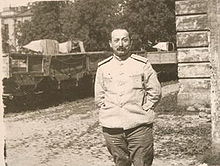Fyodor Dan

Fyodor Ilyich Dan (Template:Lang-ru) (October 19, 1871, Saint Petersburg – January 22, 1947, New York) was one of the leaders of Menshevism.
Fyodor Dan was born to a Jewish family in St. Petersburg. His original surname was Gurvitch. While still a young man he joined the Union of Struggle for the Emancipation of the Working Class. He was arrested in 1896 and exiled in Oryol for three years. On his return he joined the Russian Social Democratic Labour Party and went to London for their Second Congress in 1903. Dan aligned himself with Julius Martov who wanted to have a larger party of activists, rather than Lenin's conception of a smaller party of professional revolutionaries. Dan helped Martov form the Mensheviks, returning to Russia in 1912.
Living in St Petersburg, he edited Menshevik publications until facing exile to Minusinsk following the outbreak of World War I. He was released in 1915 when he agreed to serve in the Army as a surgeon. He returned to St Petersburg following the February Revolution and argued for Menshevik involvement in the Provisional Government. He also argued for continuing the war against Germany and Austria.
In 1917 he was the leading Menshevik on the praesidium of the Petrograd Soviet. He opposed the October Revolution and he was a member of the small oppositional group in the Russian Constituent Assembly. However this was banned in 1918. Dan continued to denounce the curtailment of political freedoms, linking Bolshevism with Bakuninism. He was arrested in 1921 and sent into exile. Dan died in New York City in the United States. When the Soviet Union was attacked in 1941, Dan gave his support to the regime. In his book The Origins of Bolshevism (1943) he argued that Bolshevism was the carrier of socialism, whilst still arguing for political liberalisation in the Soviet Union.
